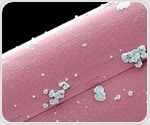| |  A trip to the dentist or orthodontist usually instills a sense of dread in most patients, and that's before the exam even begins. Add to that the fear of oral surgery with a painful recovery, and many people will avoid these visits at all costs. A trip to the dentist or orthodontist usually instills a sense of dread in most patients, and that's before the exam even begins. Add to that the fear of oral surgery with a painful recovery, and many people will avoid these visits at all costs. | |
|
| |  Food scientists from the National University of Singapore developed a rapid and highly sensitive screening technique capable of detecting minute amounts of pyrethroids in vegetables, a common type of synthetic pesticide applied on agricultural crops. The innovative strategy makes use of magnetic nanoparticles to simplify pyrethorid extraction, reducing the screening process to under two hours. Food scientists from the National University of Singapore developed a rapid and highly sensitive screening technique capable of detecting minute amounts of pyrethroids in vegetables, a common type of synthetic pesticide applied on agricultural crops. The innovative strategy makes use of magnetic nanoparticles to simplify pyrethorid extraction, reducing the screening process to under two hours. | |
|
| |  In a major advancement in nanomedicine, Arizona State University scientists, in collaboration with researchers from the National Center for Nanoscience and Technology, of the Chinese Academy of Sciences, have successfully programmed nanorobots to shrink tumors by cutting off their blood supply. In a major advancement in nanomedicine, Arizona State University scientists, in collaboration with researchers from the National Center for Nanoscience and Technology, of the Chinese Academy of Sciences, have successfully programmed nanorobots to shrink tumors by cutting off their blood supply. | |
|
| |  A team of young researchers at the National University of Science and Technology has recently presented its new development – therapeutic material based on nanofibers of polycaprolactone, modified with plasma-deposited thin layers enriched with antibacterial composition and human blood plasma components. A team of young researchers at the National University of Science and Technology has recently presented its new development – therapeutic material based on nanofibers of polycaprolactone, modified with plasma-deposited thin layers enriched with antibacterial composition and human blood plasma components. | |
|
| |  A new cellular messenger discovered by Weill Cornell Medicine scientists may help reveal how cancer cells co-opt the body's intercellular delivery service to spread to new locations in the body. A new cellular messenger discovered by Weill Cornell Medicine scientists may help reveal how cancer cells co-opt the body's intercellular delivery service to spread to new locations in the body. | |
|
| |  Nanomedicines need to get taken up by diseased cells in order to release their cargo. Cancer cells have altered membrane properties, which hamper their ability to take up nanomedicines. Nanomedicines need to get taken up by diseased cells in order to release their cargo. Cancer cells have altered membrane properties, which hamper their ability to take up nanomedicines. | |
|
| |  This article explains what organoids are, how they are formed from stem cells and how they are applied in research. This article explains what organoids are, how they are formed from stem cells and how they are applied in research. | |
|
| |  Researchers at Okayama University report in Scientific Reports a promising method for delivering viral DNA, able to eliminate cancerous cells, to a tumor. The approach, involving encapsulation of the DNA in liposomes, has the potential to enable intravenous delivery of virus-based antitumor agents. Researchers at Okayama University report in Scientific Reports a promising method for delivering viral DNA, able to eliminate cancerous cells, to a tumor. The approach, involving encapsulation of the DNA in liposomes, has the potential to enable intravenous delivery of virus-based antitumor agents. | |












































No hay comentarios:
Publicar un comentario